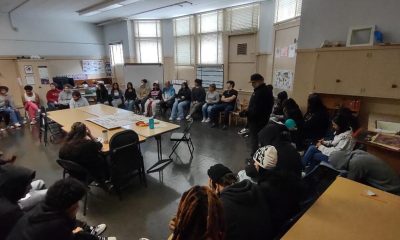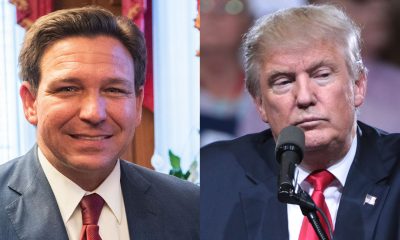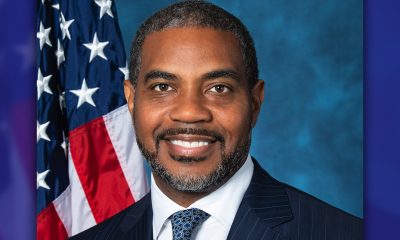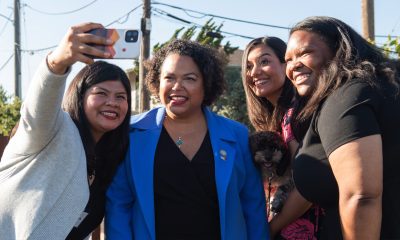World
Q&A: US Government Eases Cuba Travel Restrictions

In this Dec. 19, 2014 photo, tourists sunbathe as a vendor sells kites decorated with Cuba’s flag on a beach near Havana, Cuba. A new set of U.S. government regulations takes effect Friday, Jan. 16, 2015, severely loosening the 50-decade long travel and trade restrictions for Cuba. (AP Photo/Desmond Boylan, File)
SCOTT MAYEROWITZ, AP Airlines Writer
NEW YORK (AP) — Americans are one step closer to being able to vacation in Cuba, but don’t pack your bathing suit and sunscreen just yet.
A new set of government regulations takes effect Friday, severely loosening travel and trade restrictions that have been in place for 54 years. The rules follow President Barack Obama’s announcement last month of a reestablishment of diplomatic relations with the communist island. Only Congress can fully remove the embargo but it is up to the administration to enforce — or turn a blind eye — to the travel ban.
Travel and hospitality companies are salivating at the chance to set up shop in Cuba. Delta Air Lines, JetBlue Airways, Hilton Worldwide, Marriott International and the Carnival Corp. have all expressed interest. United Airlines became the latest travel company to publicly express plans to enter Cuba, saying Thursday it wants to fly there from Newark, New Jersey and Houston, Texas if both governments allow it to do so.
Americans have long been drawn to Cuba for its close proximity, its warm climate and the taboo nature of visiting a country off-limits to U.S. citizens since the 1960s. Here’s a look at what the latest government rules mean for them.
Q: CAN U.S. CITIZENS VISIT CUBA?
A: The U.S. Treasury’s Office of Foreign Assets Control oversees travel to Cuba. There are 12 categories of people who are allowed to visit. They include close relatives of Cubans, academics, those traveling on official government business, those on humanitarian or religious missions, journalists and people on accredited cultural education programs.
Q: WHAT CHANGED?
A: The groups of people allowed to visit Cuba remain the same but they no longer need to apply for a license to travel.
Q: WHAT ABOUT EVERYBODY ELSE?
A: That’s fuzzier. It’s still illegal for Americans to visit Cuba if they don’t fit into one of those 12 groups, but without the need to apply for a license it could be impossible for the government to enforce such a restriction.
Q: HOW CAN I BUY A TICKET?
A: Until now, the government has issued licenses to tour operators who then help travelers obtain visas and sell spots on trips to Cuba. Many of them are mom and pop travel agencies in Florida, catering to Cuban-Americans. Others are large tour companies offering weeklong educational trips for $3,000 to nearly $8,000 a person. The new regulations allow travel agents and airlines to sell tickets without the need for a specific license from Office of Foreign Assets Control. That means it will be much easier to book a trip and prices should come down significantly.
Q: HOW DO U.S. TRAVELERS BUY GOODS IN CUBA?
A: Banks and credit card companies have been prohibited from doing business in Cuba. That gets lifted in these new rules. But don’t expect to see ATMs or businesses accepting Visa, MasterCard or American Express immediately. Large hotels are likely to be the first businesses to let travelers swipe to pay but mom and pop restaurants or local shops could take much longer. So travelers — in the near term — still need to bring a lot of cash.
Q: WHAT CAN AMERICANS BRING BACK?
A: Authorized visitors can bring home up to $400 worth of goods acquired in Cuba for personal use. This includes no more than $100 worth of alcohol or tobacco products.
Q: WILL THERE BE LIMITS TO THE NUMBER OF VISITORS?
A: Without the need for a license, there is no limit. However, Cuba only has so many hotel rooms and other necessary infrastructure to support tourism. In the short term, that will curtail the number of visitors.
Q: WHO FLIES FROM THE U.S. TO CUBA?
A: American Airlines, JetBlue and Sun Country offer charter flights to the Cuban cities of Havana, Holguin, Santa Clara and Cienfuegos. Until now, the only way onto those planes was through one of those travel agencies. That could quickly change. But don’t expect airlines to suddenly flood the market. Like all other route decisions, airlines need to see if there is a large enough market willing to pay high enough airfares. For instance, a Southwest Airlines spokesman said Thursday, “Cuba is a good future opportunity we are studying.” And Cuba is still a difficult destination to serve. JetBlue brings a mechanic along on each of its charter flights.
Q: ARE THERE OTHER WAYS FOR AMERICANS TO VISIT CUBA?
A: The Cuban government doesn’t prohibit Americans from visiting. So for years, intrepid travelers have broken the U.S. law by entering Cuba via Mexico or Canada and asking officials not to stamp their passports.
__
Scott Mayerowitz can be reached at http://twitter.com/GlobeTrotScott.
Copyright 2015 The Associated Press. All rights reserved. This material may not be published, broadcast, rewritten or redistributed.
Activism
South African Solidarity Committee Hosts 31st Annual Celebration
“We’re all together for each other celebrating 31 years of building international solidarity between the people of the United States and South Africa toward the implementation of the 1955 Freedom Charter and 2030 Sustainable Development Goals,” said COSAS Operations Manager Nicole Richards.Located in Berkeley, COSAS is dedicated to the continuing struggle by the people of South Africa’s need for independence.

By Carla Thomas
The Committee of South African Solidarity (COSAS) celebrated its 31st anniversary on Saturday, Oct. 26 at the East Bay Church of Religious Science in Oakland.
Themed “Ubuntu,” a word in Zulu and Xhosa, which means “I am because we are,” the event brought together supporters and community members.
“We’re all together for each other celebrating 31 years of building international solidarity between the people of the United States and South Africa toward the implementation of the 1955 Freedom Charter and 2030 Sustainable Development Goals,” said COSAS Operations Manager Nicole Richards.
Located in Berkeley, COSAS is dedicated to the continuing struggle by the people of South Africa’s need for independence.
A soulful meal was prepared by Chef Rene Johnson and Blackberry Soul Catering along with live entertainment and speakers.
COSAS is an all-volunteer, private membership organization, made up of South Africans, Africans, students, professionals, clergy and others committed to building solidarity between the working people of the U.S. and the South African people still struggling for economic and political freedom.
Formed in 1993, the organization promotes the “real nature” of the changes and struggles taking place in South Africa and the African continent, according to Richards.
“COSAS counters ‘disinformation’ and ‘misinformation’ in the U.S. and Western mainstream media that creates division and distrust,” Richards said. “We produce the South African Beacon and organize and transport solidarity shipments of school supplies to South African grade schools requesting assistance,” Richards said.
According to organizers, COSAS is completely run by volunteers, free from the corporate and government agendas that continue to keep South Africa dependent on the West.
“We rely on the support of concerned individuals. Call us today about how you can get involved by sorting and packing supplies, donating office equipment, and supporting special events,” said Richards.
Earlier in the year, COSAS hosted its World Affairs film showing at Downs Memorial United Methodist Church. The screening featured a short film, “Feeding a Crisis: Africa’s Manufactured Hunger Pandemic,” exploring the hunger challenges African countries face and approaches to resolving the issues.
Contact the Committee for South African Solidarity, 1837 Alcatraz Ave., Berkeley, CA, 510-251-0998 for volunteer opportunities and event information.
Community
How Mobihealth Drives a Telemedicine Revolution in Africa
As a child growing up in northern Nigeria, Dr. Funmi Adewara experienced a severe hand injury that required multiple surgeries and frequent hospital visits. These visits exposed her to the harsh realities of the country’s healthcare system. “I remember sitting in overcrowded waiting rooms, watching doctors stretched thin, unable to meet the needs of so many patients,” Adewara recalls. This formative experience ignited her passion for transforming healthcare in Africa.

By Ifeanyi Abraham
CNN
As a child growing up in northern Nigeria, Dr. Funmi Adewara experienced a severe hand injury that required multiple surgeries and frequent hospital visits.
These visits exposed her to the harsh realities of the country’s healthcare system. “I remember sitting in overcrowded waiting rooms, watching doctors stretched thin, unable to meet the needs of so many patients,” Adewara recalls.
This formative experience ignited her passion for transforming healthcare in Africa.
Growing up with a mother who worked as a nurse, Adewara’s understanding of healthcare challenges deepened through her mother’s stories.
“I knew early on that healthcare wasn’t a privilege — it was a necessity, and I wanted to be part of changing the system,” she explains.
After training as a physician, Adewara worked for 15 years in the United Kingdom’s National Health Service before founding the telemedicine platform Mobihealth in 2017.
Since its launch, Mobihealth has impacted thousands of lives, connecting patients with doctors and healthcare professionals across Nigeria and beyond.
The platform has 20 integrated telehealth clinics that offer remote consultations, diagnostics, and access to specialist care via digital health tools. Located primarily in Nigeria, these clinics are accessible to patients through various subscription plans and are often financed through partnerships with global donor organizations and private donors.
In addition to the clinics, Mobihealth has partnerships with over 200 hospitals, labs, and pharmacies, Adewara says.
The company has earned global recognition, including a $1 million grant from the U.S. Trade and Development Agency in 2022. Adewara was also one of the World Bank’s seven 2020 Sustainable Development Goals & Her award winners, selected from over 2,400 entries worldwide.
Connecting Rural Patients
Across sub-Saharan Africa, millions struggle to access basic healthcare. According to the World Health Organization, the region bears 25% of the global disease burden but has only 3% of the world’s healthcare workers.
“In rural Africa, a trip to the nearest hospital can mean the difference between life and death,” says Adewara.
Mobihealth’s latest initiative offers healthcare for $1 a month for rural and underserved populations. It allows Africans in the diaspora — and global supporters — to sponsor essential services like doctor consultations, diagnostic tests, and access to telemedicine clinics.
The scheme is not solely based on donations; individuals can also subscribe to the service for themselves.
“Healthcare systems across Africa are under immense pressure,” Adewara explains. “Our initiative is a direct response, using technology to connect rural patients with doctors thousands of miles away.”
For Adewara, Mobihealth’s telemedicine platform is not a temporary fix; it represents the future of healthcare in Africa.
“This is about creating a resilient, sustainable and inclusive system, where people, no matter where they are, can access the care they need,” she says.
“Telemedicine brings doctors to people, wherever they may be. By integrating AI and remote monitoring, we are improving the speed and accuracy of care, saving lives in the process,” she adds.
A number of African companies provide telemedicine services, but researchers have pointed out that there are obstacles that could hinder the growth of telemedicine in the continent.
Rural areas can have an unreliable electricity supply and poor internet connectivity, and there is often a lack of government policies and funding around virtual healthcare.
“A Healthcare System for the Future”
Adewara envisions scaling her company’s model to reach millions more across Africa, particularly in countries like Ghana, Kenya, and Ivory Coast.
“Our work is just beginning,” she says. “We are building a healthcare system for the future — one that is resilient, inclusive and capable of meeting Africa’s growing population’s needs.”
However, partnerships are crucial to achieving this vision. “We can’t do this alone. Our collaborations with the African diaspora, hospitals, governments, and international organizations allow us to reach more people and ensure that healthcare is affordable, efficient and accessible,” Adewara adds.
Activism
Atty General Rob Bonta Joins Coalition Backing Pres. Biden’s Migrant Parole Program
“The Biden Administration’s CHNV Parole Program provides a safe pathway to apply for protection for Cuban, Haitian, Nicaraguan, or Venezuelan migrants fleeing violence and upheaval. We urge the court to uphold this program that creates orderly processes for people fleeing humanitarian crises to lawfully reach the United States,” said California Attorney General Rob Bonta. The federal government has exercised its authority under the Immigration and Nationality Act to parole migrants into the country for humanitarian purposes since the Eisenhower Administration.

By Bo Tefu, California Black Media
Attorney General Rob Bonta joined a multistate coalition of 18 attorneys general to write an amicus brief supporting President Joe Bidens’s Parole Program for migrants fleeing violence.
The multistate coalition will submit the brief to the Fifth Circuit Court of Appeals regarding the case Texas v. U.S. Department of Homeland Security. The brief endorses Biden’s Parole Program for Cubans, Haitians, Nicaraguans, and Venezuelans (CHNV Parole Program). The migrant parole program allows individuals from the four countries to apply for advance travel authorization. Migrants can be considered for temporary humanitarian parole of up to two years including employment authorization.
The coalition highlighted California’s interest in maintaining the federal government’s discretionary power granting migrants entry or allowing immigrants to stay on humanitarian grounds.
“In California, we believe that migrants escaping violence should be treated with compassion and dignity, and immigration parole programs are a crucial part of a just and secure immigration system,” said Bonta.
“The Biden Administration’s CHNV Parole Program provides a safe pathway to apply for protection for Cuban, Haitian, Nicaraguan, or Venezuelan migrants fleeing violence and upheaval. We urge the court to uphold this program that creates orderly processes for people fleeing humanitarian crises to lawfully reach the United States,” he said.
The federal government has exercised its authority under the Immigration and Nationality Act to parole migrants into the country for humanitarian purposes since the Eisenhower Administration.
The coalition argued that the lawsuit in Texas threatened to undermine the federal government’s authority to establish crucial programs that help migrants escape unstable circumstances in their home countries.
The coalition stated that parole provides safe, legal, and orderly pathways for people to seek protection in the United States.
However, opponents claim that parole pathways help increase crime and impose costs on states.
-

 Alameda County4 weeks ago
Alameda County4 weeks agoAlameda County District Attorney Pamela Price Announces $7.5 Million Settlement Agreement with Walmart
-

 Activism3 weeks ago
Activism3 weeks ago‘Jim Crow Was and Remains Real in Alameda County (and) It Is What We Are Challenging and Trying to Fix Every Day,’ Says D.A. Pamela Price
-

 Bay Area4 weeks ago
Bay Area4 weeks agoIn the City Attorney Race, Ryan Richardson Is Better for Oakland
-

 Activism3 weeks ago
Activism3 weeks agoOakland Post: Week of October 30 – November 5, 2024
-

 Alameda County3 weeks ago
Alameda County3 weeks agoD.A. Price Charges Coliseum Flea Market Vendors in Organized Retail Theft Case
-

 Activism3 weeks ago
Activism3 weeks ago‘Criminal Justice Reform Is the Signature Civil Rights Issue of Our Time,’ says D.A. Pamela Price
-

 Activism3 weeks ago
Activism3 weeks ago“Two things can be true at once.” An Afro-Latina Voter Weighs in on Identity and Politics
-

 Activism1 week ago
Activism1 week agoLIVE! — TOWN HALL ON RACISM AND ITS IMPACT — THURS. 11.14.24 5PM PST




















































